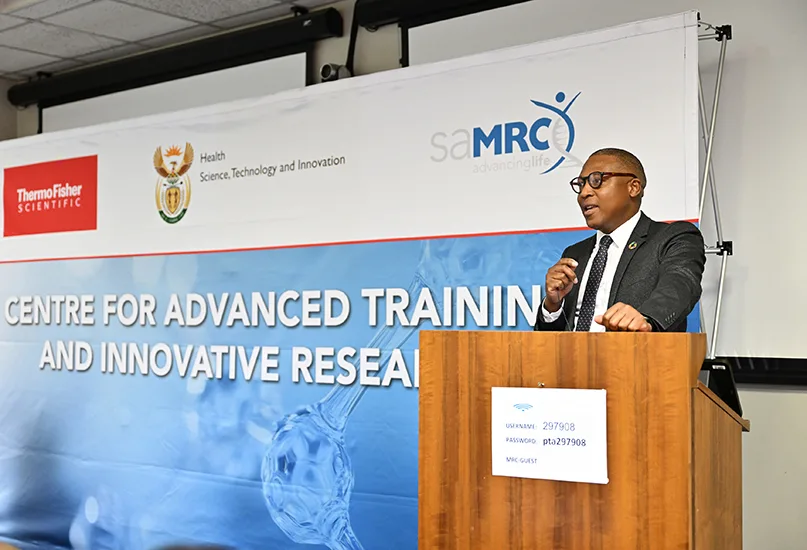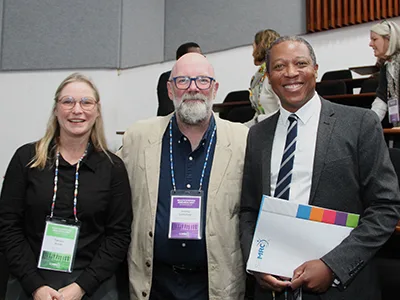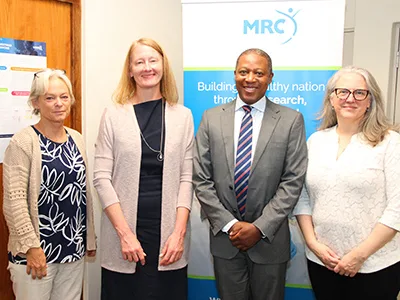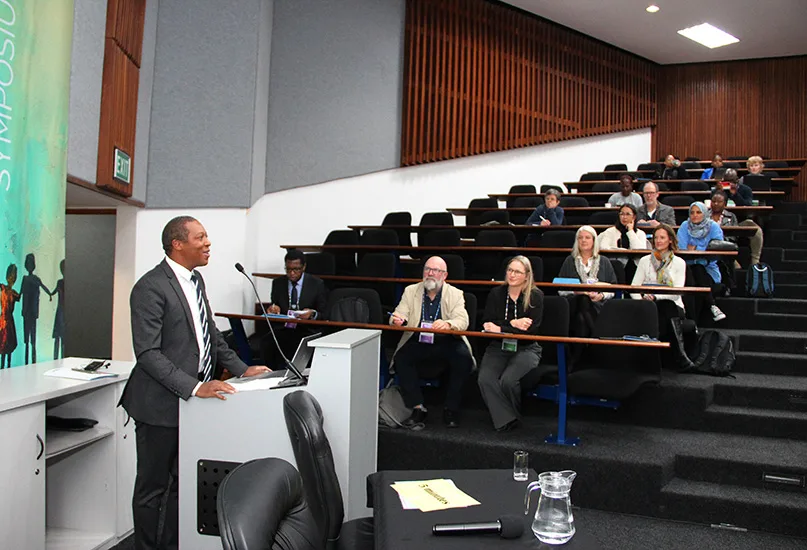The South African Medical Research Council is dedicated to improving the health of South Africans through research, innovation, capacity development, and technology transfer. Ntobeko Ntusi, President and CEO, outlines the organisation’s research on South Africa’s quadruple burden of disease and assesses the impact of the US funding withdrawal.
CUSTODIAN OF HEALTH RESEARCH
More than 30 years after a peaceful transition from apartheid to democracy, South Africa (SA) has complex and dysfunctional two-tiered healthcare.
Despite serving 84 percent of the population, the public healthcare system in SA is chronically understaffed, with more than 70 percent of doctors employed in the private healthcare system.
Inadequate public healthcare funding has also resulted in a complex mix of health challenges, alongside a fragmented health system with poor management, low staff morale, and sometimes a lack of essential resources like medicines and functional equipment.
“Daily, health practitioners face moral dilemmas – staff shortages, a lack of life-saving medications, unavailability of functional diagnostic equipment, and other resource allocation decisions,” insights Ntobeko Ntusi, President and CEO of the South African Medical Research Council (SAMRC).
Furthermore, SA’s healthcare system is contending with several colliding epidemics – HIV and tuberculosis (TB); cardiovascular disease, mental health, and other non-communicable diseases; substance abuse and violence; and an unacceptably high mortality caused by maternal, neonatal, and childhood disease.
Of the country’s population of 65 million, more than 12 percent are infected with HIV. Consequently, SA has the world’s largest antiretroviral therapy programme, subsidised by the government and provided free of charge.
This high HIV prevalence drives the TB burden; in the last 15 years, HIV infection has been associated with significant improvement in treatment outcomes. As a result of the HIV epidemic, life expectancy has not changed much over the past 35 years.
Since 2012, cardiovascular disease has been the leading cause of mortality in SA. Therefore, whilst maintaining the important gains in dealing with endemic infectious diseases like HIV and TB, it is critical that the country invests with urgency to curb the rising tide of noncommunicable diseases.
Additionally, healthcare in SA has numerous unique challenges, including a very high burden of multimorbidity and growing health disparities reflecting high levels of poverty, inequality, and unemployment.
“In SA, more than in most other contexts, medicine is practiced at a unique intersection of excellence and inequity. We’re home to some of the most sophisticated academic hospitals on the continent and in the world but, at the same time, have deeply underserved rural, urban, and peri-urban communities where resources are stretched and access is limited,” Ntusi weighs up.

QUADRUPLE BURDEN OF DISEASE
A public entity of the SA government, SAMRC was established through statute in 1969 with a vision of improving the health of South Africans through research, innovation, capacity development, and technology transfer.
With a complement of around 800 personnel distributed over four campuses in Cape Town, Pretoria, Durban, and Johannesburg, SAMRC’s mission is to advance health and quality of life and address inequity by conducting and funding relevant and responsive health research, capacity development, innovation, and research translation.
“These activities are underpinned by our values of pioneering, partnering, excellence, respect, integrity and citizenship,” outlines Ntusi.
The scope of research conducted and funded by SAMRC includes discovery science, basic and translational research, clinical trials, epidemiology, and population and implementation research.
Increasingly, the organisation supports social and behavioural sciences as they pertain to human health and behaviour.
“Our priority areas of research focus include SA’s quadruple burden of disease – maternal, newborn, and child health, HIV/AIDS and TB, noncommunicable diseases, and interpersonal violence,” Ntusi notes.
“In addition, we support scholarship on climate change and health, digital health and artificial intelligence (AI), antimicrobial resistance, and pandemic preparedness.”
SAMRC has a strong interest in health systems and producing evidence to inform the planning and implementation of universal health coverage in SA.
In a major milestone for the country, SAMRC was instrumental in supporting the recent award of a substantial grant for the implementation of research and health services related to lenacapavir for HIV prevention.
“Ultimately, our work is to acquire evidence-based information to inform health policy and improve the quality and health status of people in SA,” he adds.

“In SA, more than in most other contexts, medicine is practiced at a unique intersection of excellence and inequity. We’re home to some of the most sophisticated academic hospitals on the continent and in the world but, at the same time, have deeply underserved rural, urban, and peri-urban communities where resources are stretched and access is limited”
Ntobeko Ntusi, President and CEO, South African Medical Research Council
VACCINE DEVELOPMENT AND SOVEREIGNTY
SAMRC leads many areas of scientific development in SA, where vaccine development and sovereignty have been identified as key priorities.
The World Health Organisation (WHO) recently established three African vaccine hubs in SA, Senegal, and Kenya.
SAMRC, together with the National Department of Health, is the implementing agent for the South African hub.
In addition, the WHO, together with the Medicines Patent Pool, has established an mRNA technology transfer platform to ensure a sustainable source of mRNA vaccine, biologic, and therapeutic platforms, with a hub in SA and nodes in 14 other countries.
“The implementation of the work of the hub in SA is led by SAMRC in partnership with Afrigen and Biovac,” Ntusi highlights.
“Through the German Development Bank (KfW), the European Commission is supporting the upgrade of infrastructure for vaccine development and manufacture in SA, with SAMRC as the implementing agency for this important project.”
SAMRC has also been involved in helping the country bolster its efforts in pandemic preparedness and prevention.
The council was recently awarded large grants from the WHO and the Global Fund to support these activities across the entire spectrum of pandemic preparedness activity, in collaboration with many national platforms.
“Since the COVID-19 pandemic, we perform weekly wastewater surveillance throughout SA and can detect microbe, pathogen, and drug levels. We can also detect new infectious disease outbreaks early,” shares Ntusi.


FUNDING RESEARCH
Dedicated to coordinating and funding health research across the country, SAMRC has 10 intramural research units.
These units conduct research in every corner of SA on the burden of disease, environment and health, gender and health, noncommunicable diseases, health systems, mental health, alcohol and substance abuse, evidence synthesis, tuberculosis, HIV and other infectious diseases, and biostatistics and nutrition.
SAMRC also has enabling platforms that serve as national core facilities for molecular biology, genomics, animal, and malaria research.
“We support the responsible conduct of research through our research ethics office and research integrity office,” Ntusi tells us.
The council funds research in all South African universities and pays particular attention to supporting historically disadvantaged institutions.
Moreover, SAMRC funds research within its sister science councils as well as in independent research institutions distributed throughout the country.
“In addition, we have about 30 extramural research units or centres of research excellence based at South African universities in seven of the nine provinces in the country,” states Ntusi.
Through co-funding agreements like the European and Developing Countries Clinical Trials Partnership (EDCTP) and the Grand Challenges programme, we are continually looking to expand the reach of our scientific support beyond our borders to the rest of the African region.”
“Our priority areas of research focus include SA’s quadruple burden of disease – maternal, newborn, and child health, HIV/AIDS and TB, noncommunicable diseases, and interpersonal violence”
Ntobeko Ntusi, President and CEO, South African Medical Research Council
US FUNDING WITHDRAWAL
For decades, SA has been the largest foreign recipient of US federal funding from the National Institutes of Health (NIH).
Similarly, the country has also been one of the largest recipients of overseas development assistance through agencies such as the US President’s Emergency Plan for AIDS Relief (PEPFAR), the US Agency for International Development (USAID), and the Center for Disease Control and Prevention (CDC) – all which have underpinned vital health research initiatives.
Withdrawal of US federal support for research in SA threatens not only the continuity of research but also the national capacity to address emerging health challenges.
“The recent announcement of a pause to NIH funding to subawards outside the US represents a direct threat to global research and innovation in medical research,” Ntusi warns.
As Africa’s leading research-intensive country, SA has led the development of innovations in HIV, TB, and other infectious diseases that impact infants and children.
In addition, the country has made fundamental contributions to discovery and non-communicable diseases research, with the evidence garnered impacting clinical care and people management the world over.
“Over many years, South African clinical research scientists have contributed immensely to the improvement of health outcomes of infants and people living with HIV, TB, and non-communicable diseases, changing global clinical guidance,” affirms Ntusi.
“South African science has changed global policy, guidelines, and management, and has improved the health outcomes for the most challenging public health challenges of this century.”
NIH has funded 814 direct awards and 450 subawards to South African investigators, in addition to collaborative research through network funding of the HIV Vaccine Trials Network (HVTN), AIDS Clinical Trials Group (ACTG), International Maternal Pediatric Adolescent AIDS Clinical Trials (IMPAACT), and HIV Prevention Trials Network (HPTN) to a conservative value of USD$120 million per annum for the last 10 years.
“There has been a logarithmic increase in funding since 2005 as SA has become an integral country contributing to Phase 3 prevention and treatment trials, including pivotal COVID-19 vaccine trials,” Ntusi informs us.

IMMEDIATE RESPONSE
As the custodian of health research in SA, SAMRC responded immediately to the US funding withdrawal by using its convening power to bring all research-active institutions together to ensure a coordinated national response, as well as conducting a landscape survey to understand the number of grants, staff, researchers, and students who would be affected.
SAMRC also led the fundraising efforts to provide emergency support for the national health research ecosystem from the SA government and key partners like the Gates Foundation and Wellcome Trust.
In the short term, SAMRC had five key priorities, namely the need to:
- 1. Provide the much-needed support to established research groups working in national priority areas to enable them to pivot to other sources of funding.
- 2. Support early- and mid-career scientists who have greater exposure and vulnerability from these funding withdrawals.
- 3. Maintain key research and clinical trials infrastructure.
- 4. Enable postgraduate student and postdoctoral fellows to complete their research training, which has been disrupted by the termination of research grants.
- 5. Support research groups undertaking interventional studies to terminate these ethically and provide resources for the follow-up of study participants.
“In the past few weeks, we have disbursed nearly ZAR400 million to about 80 research groups that were adversely affected by these withdrawals,” acclaims Ntusi.
THREE KEY PRIORITIES
Given the withdrawal of US funding, SAMRC’s first priority for the coming year is to diversity its sources of funding by ensuring the South African government understands the value proposition of health research being fundamental to human capacity development and economic growth.
“The investment from our government is key to enable support from others. Aligned to this, I am in the process of establishing an SAMRC Foundation, with the goal of building a large endowment to support health research in sub-Saharan Africa,” Ntusi reveals.
SAMRC’s second priority is to continue to think deeply about the culture of the organisation and strive for continuous improvement through defining its core values, prioritising leadership that models desired behaviours, and actively listening to employee feedback to understand needs and drive action.
To achieve these, the organisation needs to consistently prioritise employee well-being, embrace DEI, and ensure open and effective communication and partnerships.
“Finally, we need to be constantly thinking about how we can dismantle existing asymmetries in global health and use science and our scholarship to contribute to building a more equitable society,” concludes Ntusi.






















